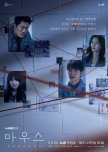Too many plots, too many questions, yet too many answers
A good mystery has questions and uncertainty, but gives answers as well, right or wrong. It lets viewers, even casual ones, come to their own concrete guesses, and when things are solved or revealed, it adds to the fun.
The problem with Mouse then, is that it has way too many questions, grossly overuses cliffhangers and fake outs, makes the viewer question the show's writers and not themselves, and has far too many subplots and characters to keep track of. In other words, the questions you as are "wait, what just happened again?" instead of "how does this evidence play into the story?"
First the good: all the actors play their role super well. The music, though mostly atmospheric, is fitting. The handful of characters you pay attention to get good development. And despite what I said above, the show holds your attention.
It's disappointing because the first half of the show, particularly the first episodes, was gripping. The plot was well paced, the writers let the viewers get answers and figure things out. Then things went down the toilet rapidly after the middle of the show. It got to the point that I, at least, wasn't really interested in any big reveals, cliffhangers, or those "character stares at something off screen in horror" moments because I knew in the very next episode it was going to be a fake out / misleading camera angle. That, to me, is bad writing to overuse plot progression devices and not give answers. Doesn't help that they tried to stuff a "conspiracy" plot in as well, as it hitting every genre possible.
Then there's the problem with way too many characters. It wouldn't be so bad if they let us match faces to names, but most of them, particularly the victims, get little to no screentime to get to know them before they're relegated to plot devices as victims or exposition dumps. This makes most of the characters have no depth and they all become the same thing: murder victims. Deep into the show, when they rapid fire off names and their relations without showing faces I just nod along and not care because they're just victims without history - they only matter that way, and not as their own character. Heck people had to make graphs and documents to keep track of who's who. That's really not fun to consult when watching.
Other minor things: the abusive use of jump cuts / supercuts, particularly in the mid-to-end of the show, is extremely jarring. Sometimes the scene would last like five seconds before it cuts into the character now in the next day with no proper transition. Some characters start off strong then turn into a wet emotional noodle (you know what I'm talking about). Some of the plot at the end will really make your eyes roll even if it does give closure to some scenes at the beginning.
In the end, It's a show carried by its wonderful actors.
The problem with Mouse then, is that it has way too many questions, grossly overuses cliffhangers and fake outs, makes the viewer question the show's writers and not themselves, and has far too many subplots and characters to keep track of. In other words, the questions you as are "wait, what just happened again?" instead of "how does this evidence play into the story?"
First the good: all the actors play their role super well. The music, though mostly atmospheric, is fitting. The handful of characters you pay attention to get good development. And despite what I said above, the show holds your attention.
It's disappointing because the first half of the show, particularly the first episodes, was gripping. The plot was well paced, the writers let the viewers get answers and figure things out. Then things went down the toilet rapidly after the middle of the show. It got to the point that I, at least, wasn't really interested in any big reveals, cliffhangers, or those "character stares at something off screen in horror" moments because I knew in the very next episode it was going to be a fake out / misleading camera angle. That, to me, is bad writing to overuse plot progression devices and not give answers. Doesn't help that they tried to stuff a "conspiracy" plot in as well, as it hitting every genre possible.
Then there's the problem with way too many characters. It wouldn't be so bad if they let us match faces to names, but most of them, particularly the victims, get little to no screentime to get to know them before they're relegated to plot devices as victims or exposition dumps. This makes most of the characters have no depth and they all become the same thing: murder victims. Deep into the show, when they rapid fire off names and their relations without showing faces I just nod along and not care because they're just victims without history - they only matter that way, and not as their own character. Heck people had to make graphs and documents to keep track of who's who. That's really not fun to consult when watching.
Other minor things: the abusive use of jump cuts / supercuts, particularly in the mid-to-end of the show, is extremely jarring. Sometimes the scene would last like five seconds before it cuts into the character now in the next day with no proper transition. Some characters start off strong then turn into a wet emotional noodle (you know what I'm talking about). Some of the plot at the end will really make your eyes roll even if it does give closure to some scenes at the beginning.
In the end, It's a show carried by its wonderful actors.
Was this review helpful to you?






